Here’s my list of recommended Broadway, off-Broadway, and out-of-town shows, updated weekly. In all cases, I gave these shows favorable reviews (if sometimes qualifiedly so) in The Wall Street Journal when they opened. For more information, click on the title.
BROADWAY:
• An American in Paris (musical, G, too complex for small children, nearly all performances sold out, reviewed here)
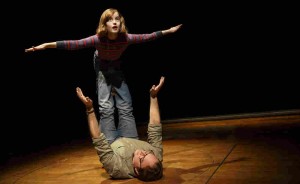 • Fun Home (serious musical, PG-13, nearly all performances sold out, reviewed here)
• Fun Home (serious musical, PG-13, nearly all performances sold out, reviewed here)
• Hand to God (black comedy, X, absolutely not for children or prudish adults, reviewed here)
• A Gentleman’s Guide to Love & Murder (musical, PG-13, reviewed here)
• The King and I (musical, G, perfect for children with well-developed attention spans, all performances sold out, reviewed here)
• It’s Only a Play (comedy, PG-13/R, closes June 7, reviewed here)
• Matilda (musical, G, reviewed here)
• Les Misérables (musical, G, too long and complicated for young children, reviewed here)
• On the Town (musical, G, contains double entendres that will not be intelligible to children, reviewed here)
• On the Twentieth Century (musical, G/PG-13, nearly all performances sold out, extended through July 19, contains very mild sexual content, reviewed here)
• The Visit (serious musical, PG-13, far too dark and disturbing for children, reviewed here)
OFF BROADWAY:
• Alfred Hitchcock’s The 39 Steps (comedy, G, ideal for bright children, remounting of Broadway production, original production reviewed here)
• The Fantasticks (musical, G, suitable for children capable of enjoying a love story, reviewed here)
CLOSING SOON OFF BROADWAY:
• Grounded (play, PG-13/R, explicit sexual references, closes May 24, reviewed here)
CLOSING NEXT WEEK IN BALTIMORE:
• After the Revolution (drama, G/PG-13, unsuitable for children, closes May 17, reviewed here)



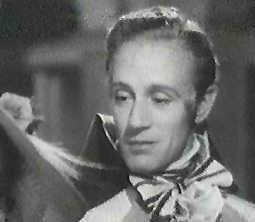 1. What was your favorite book as a child? Oddly enough, I don’t remember reading children’s books, though I know I did. The first novel that I clearly recall reading through the eyes of a child was The Scarlet Pimpernel, which I adored. I reread it as an adult with only modest pleasure, but the 1934 film version in which Leslie Howard plays Sir Percy Blakeney remains a favorite.
1. What was your favorite book as a child? Oddly enough, I don’t remember reading children’s books, though I know I did. The first novel that I clearly recall reading through the eyes of a child was The Scarlet Pimpernel, which I adored. I reread it as an adult with only modest pleasure, but the 1934 film version in which Leslie Howard plays Sir Percy Blakeney remains a favorite.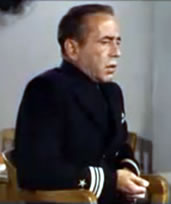 8. Do you remember the first “grown-up” book you read? I’m pretty sure it was either Allen Drury’s Advise and Consent or Herman Wouk’s The Caine Mutiny, both of which I had initially read as
8. Do you remember the first “grown-up” book you read? I’m pretty sure it was either Allen Drury’s Advise and Consent or Herman Wouk’s The Caine Mutiny, both of which I had initially read as 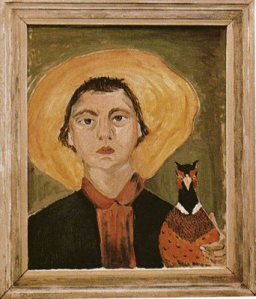 14. What author, living or dead, would you most like to have dinner with? Probably Flannery O’Connor, though I can imagine regretting the choice after the fact. I expect she could be a tricky dinner companion.
14. What author, living or dead, would you most like to have dinner with? Probably Flannery O’Connor, though I can imagine regretting the choice after the fact. I expect she could be a tricky dinner companion.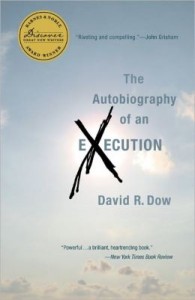 31. Has a book ever changed your mind about something? David R. Dow’s The Autobiography of an Execution changed my mind about the death penalty.
31. Has a book ever changed your mind about something? David R. Dow’s The Autobiography of an Execution changed my mind about the death penalty.
 On Friday afternoon I taped an episode of
On Friday afternoon I taped an episode of 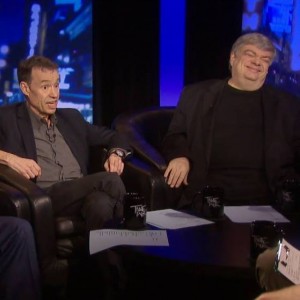 If this story has a moral, it’s that nothing—nothing—is foreseeable. Like the song says, life is pandemonium. The trick, I guess, is to accept amazement as a given, and that’s what I try to do. But it grows harder with every passing year. More and more I feel like one of those characters in the novels of John P. Marquand who suddenly realizes as he passes into middle age that he has no understanding whatsoever of the meaning (if any) of his life.
If this story has a moral, it’s that nothing—nothing—is foreseeable. Like the song says, life is pandemonium. The trick, I guess, is to accept amazement as a given, and that’s what I try to do. But it grows harder with every passing year. More and more I feel like one of those characters in the novels of John P. Marquand who suddenly realizes as he passes into middle age that he has no understanding whatsoever of the meaning (if any) of his life.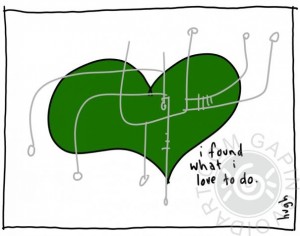 I suppose I might feel more solidly rooted in the world if, like my brother, I’d had a child somewhere along the way. Instead I’ve had books—and, now, a play and three operas—and I’m proud of them all. I’m proud, too, that I’ve figured out how to earn a living doing all kinds of things that I love to do. I know most of the people in the world aren’t nearly so lucky, and I have the common decency to be grateful for my luck. Yet I find it impossible to understand. I want my life to make more sense than it does. I’d like to be able to look back to a specific moment in my childhood and say, That’s when it all began, and I can’t do it.
I suppose I might feel more solidly rooted in the world if, like my brother, I’d had a child somewhere along the way. Instead I’ve had books—and, now, a play and three operas—and I’m proud of them all. I’m proud, too, that I’ve figured out how to earn a living doing all kinds of things that I love to do. I know most of the people in the world aren’t nearly so lucky, and I have the common decency to be grateful for my luck. Yet I find it impossible to understand. I want my life to make more sense than it does. I’d like to be able to look back to a specific moment in my childhood and say, That’s when it all began, and I can’t do it.